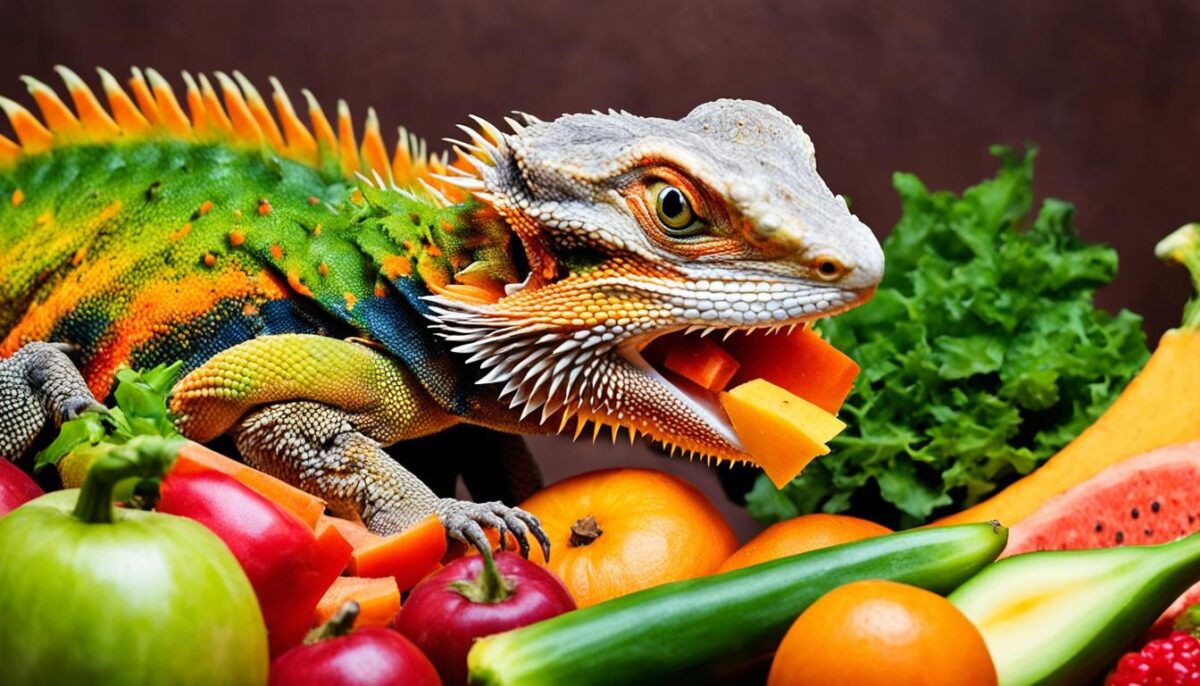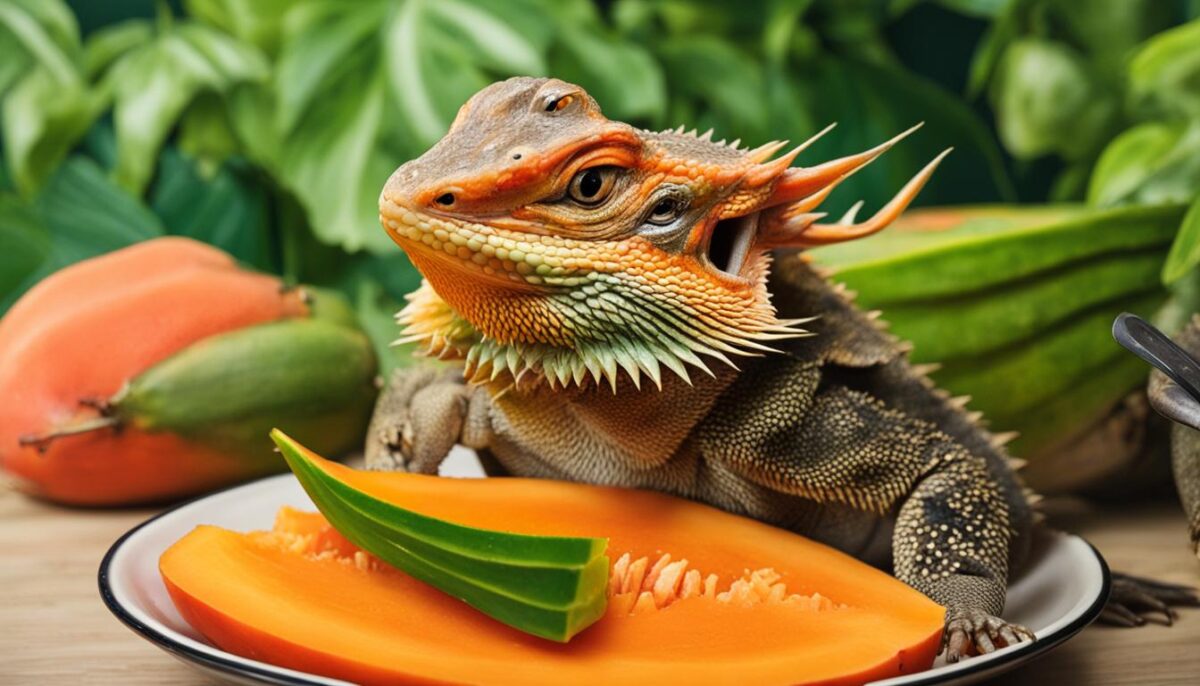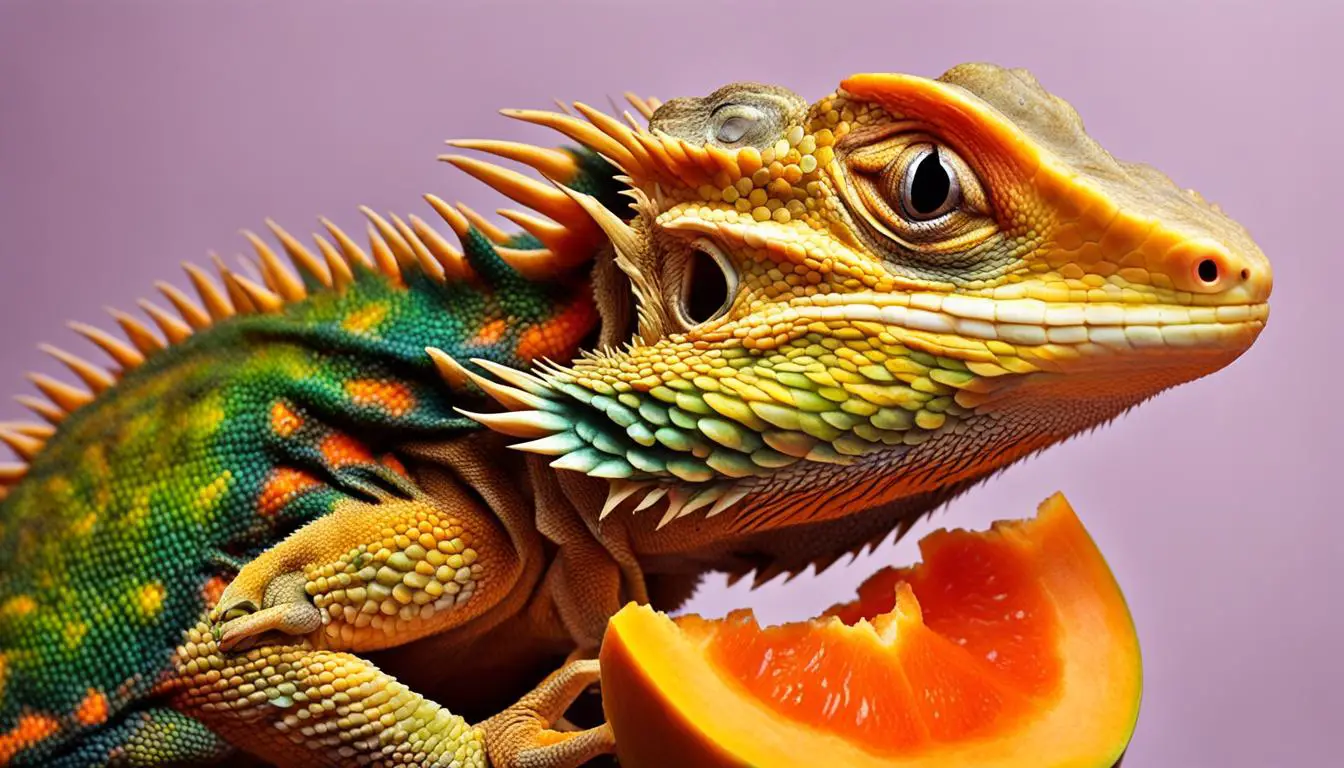If you own a bearded dragon, you might be wondering if papaya is a safe and nutritious addition to their diet. Well, you’re in the right place! In this article, we will explore whether bearded dragons can eat papaya and discuss its nutritional value. So, let’s dive in and find out!
Key Takeaways:
- Papaya is safe for bearded dragons to eat and can be offered as a treat.
- It is a tropical fruit packed with essential vitamins, minerals, and dietary fiber.
- Bearded dragons have a diverse diet that includes both plant-based and animal foods.
- While papaya is nutritious, it should be fed in moderation due to its high sugar content.
- It’s important to prepare and serve papaya properly to ensure your bearded dragon’s safety.
The Bearded Dragon Diet
Bearded dragons are fascinating creatures that require a diverse and balanced diet to thrive. As omnivores, they have the ability to consume both plant-based and animal foods. In the wild, bearded dragons have a varied diet consisting of insects, small rodents, other lizards, fruits, and vegetables. This diverse range of food sources provides them with the essential nutrients for growth and overall health.
A balanced diet is crucial for bearded dragons as it ensures they receive a comprehensive mix of nutrients to support their well-being. By offering a diverse diet, you can stimulate their appetite and prevent potential nutrient deficiencies. It is important to replicate their natural diet as closely as possible to promote optimal health.
A bearded dragon’s diet should consist of:
- A variety of insects, such as crickets, mealworms, and dubia roaches, to provide them with essential proteins and fats.
- A wide range of vegetables, including dark leafy greens like kale and collard greens, as well as squash, bell peppers, and carrots. These vegetables offer vital vitamins and minerals.
- Occasional fruits, such as papaya, to provide additional flavor, hydration, and certain vitamins.
| Nutrients | Sources |
|---|---|
| Protein | Insects (crickets, mealworms, dubia roaches) |
| Calcium | Dark leafy greens (kale, collard greens), calcium powder supplement |
| Fiber | Vegetables (squash, bell peppers, carrots) |
| Vitamins (A, C) | Fruits (papaya), dark leafy greens |
It’s important to note that while fruits can provide additional nutrients and variety to a bearded dragon’s diet, they should be fed in moderation due to their higher sugar content. The primary focus should be on providing a balance of insects and vegetables, while fruits can be offered as occasional treats to avoid excessive sugar intake. This approach ensures that bearded dragons receive all the essential nutrients necessary for their overall well-being.
When introducing new foods to your bearded dragon’s diet, it’s recommended to do so gradually. This allows their digestive system to adjust and minimizes the risk of gastrointestinal upset. Observing your bearded dragon’s response to different foods is also crucial to identify any potential allergies or adverse reactions.

Providing a diverse and balanced diet is key to maintaining the health and longevity of your bearded dragon. By replicating their natural feeding habits and ensuring they receive all the essential nutrients, you can ensure that your bearded dragon leads a happy and healthy life.
Papaya and Its Nutritional Value
Papaya is a tropical fruit that offers numerous nutritional benefits for bearded dragons. It contains essential vitamins and minerals that contribute to their overall health.
Vitamins: Papaya is particularly rich in vitamins A and C. Vitamin A is crucial for maintaining strong vision and a healthy immune system. It also promotes the development of healthy skin and tissues. Vitamin C is known for its antioxidant properties and helps boost the immune system, protecting against illness and disease.
Fiber: Another important component of papaya is dietary fiber. Fiber plays a vital role in the digestion process, aiding in the absorption of nutrients and preventing digestive issues. It keeps the digestive system healthy and contributes to regular bowel movements.
Calcium to Phosphorus Ratio: Papaya has an ideal calcium to phosphorus ratio of around 2:1, which is important for bearded dragons’ skeletal health. Calcium is essential for bone and teeth development, while phosphorus helps with energy metabolism and cell function. Maintaining a balanced calcium to phosphorus ratio is crucial for the proper growth and maintenance of bearded dragons’ bones and overall health.
| Nutrient | Amount per 100g of Papaya |
|---|---|
| Vitamin A | 950 IU |
| Vitamin C | 61.8 mg |
| Fiber | 1.7 g |
| Calcium | 20 mg |
| Phosphorus | 8 mg |

| Steps to Serve Papaya to Bearded Dragons |
|---|
| 1. Choose a ripe and fresh papaya. |
| 2. Thoroughly wash the papaya. |
| 3. Cut the papaya into small, bite-sized pieces. |
| 4. Remove any seeds from the papaya. |
| 5. Offer papaya as a treat, no more than once a week. |
Other Fruits Safe for Bearded Dragons
In addition to papaya, there are other fruits that are safe for bearded dragons to eat. Incorporating a variety of fruits into their diet can provide them with additional nutrients and flavors. However, it’s important to remember that fruits should be fed in moderation due to their higher sugar content. Here are some recommended fruits for bearded dragons:
Berries
Berries such as blueberries, strawberries, and raspberries are excellent choices for bearded dragons. These fruits are low in oxalates and offer hydration and antioxidants. They can be a refreshing and nutritious treat for your reptile friend.
Apples and Pears
Apples and pears are fruits that provide texture variation to your bearded dragon’s diet. These fruits contain essential nutrients like vitamin C, which contribute to their overall health. Make sure to remove the seeds and offer them in small, bite-sized pieces.
Melons
Melons like watermelon, cantaloupe, and honeydew are hydrating and rich in vitamins A and C. These juicy fruits can be a delicious addition to your bearded dragon’s diet. Ensure that the melon is ripe and remove any seeds before serving.
Remember, while fruits are safe for bearded dragons, they should only constitute a small portion of their overall diet. Vegetables and proteins should still make up the majority of their meals. Monitoring your dragon’s diet and providing a balanced nutritional intake is crucial for their well-being.
| Fruit | Nutritional Benefits |
|---|---|
| Berries | Low in oxalates, hydration, antioxidants |
| Apples and Pears | Texture variation, vitamin C |
| Melons | Hydrating, vitamins A and C |
Conclusion
Feeding papaya to bearded dragons can be a great way to add variety and nutrients to their diet. However, it is important to give papaya sparingly as a treat due to its high sugar content. A balanced and diverse diet is crucial for the overall health of bearded dragons, including a mix of vegetables, proteins, and limited fruits.
Papaya, with its rich nutritional value and ideal calcium to phosphorus ratio, can provide beneficial vitamins and fiber for your bearded dragon. Just remember that fruits, including papaya, should not make up the majority of their diet. Vegetables and proteins should be the primary components, with fruits comprising no more than 10-20% of their total intake.
If you have any concerns about feeding papaya or other foods to your bearded dragon, it’s always a good idea to consult a veterinarian who specializes in reptiles. They can provide specific dietary recommendations based on your pet’s individual needs. With a well-rounded and balanced diet, your bearded dragon can thrive and enjoy an array of nutritious foods in moderation.
FAQ
Can bearded dragons eat papaya?
Yes, bearded dragons can eat papaya as part of their diverse and balanced diet.
Is papaya a safe fruit for bearded dragons?
Yes, papaya is safe for bearded dragons to eat, but it should be given in moderation as a treat.
What is the nutritional value of papaya for bearded dragons?
Papaya is rich in essential vitamins, particularly vitamins A and C, and contains dietary fiber that aids digestion. It also has an ideal calcium to phosphorus ratio for bearded dragons’ skeletal health.
Are there any risks associated with feeding papaya to bearded dragons?
Yes, there are a few potential risks. Papaya has a high sugar content, so it should be monitored to prevent obesity. The high water content in papaya can cause diarrhea if consumed in excess, and some bearded dragons may have adverse reactions to certain fruits, including papaya.
How should papaya be served to bearded dragons?
Papaya should be ripe, fresh, and thoroughly washed before serving. It should be cut into small, bite-sized pieces, with any seeds removed to prevent choking.
How often can bearded dragons eat papaya?
Papaya should be offered as a treat, no more than once a week, as fruits should make up a smaller portion of their diet compared to vegetables and proteins.
What are some other safe fruits for bearded dragons?
Other safe fruits for bearded dragons include berries (blueberries, strawberries, raspberries), apples, pears, and melons (watermelon, cantaloupe, honeydew). These should also be fed in moderation due to their higher sugar content.
Why is a balanced diet important for bearded dragons?
A balanced diet is crucial for the health and wellbeing of bearded dragons, ensuring they receive a comprehensive mix of nutrients and stimulating their appetite.
Can bearded dragons eat papaya as their regular dinner?
No, papaya should be given sparingly as a treat due to its high sugar content. A balanced and diverse diet consisting of vegetables, proteins, and limited fruits is essential for the overall health of bearded dragons.
Should I consult a veterinarian before feeding papaya to my bearded dragon?
It is always a good idea to consult a veterinarian if you have any concerns about feeding papaya or other foods to your bearded dragon, especially if you notice any changes in behavior or digestive issues.


